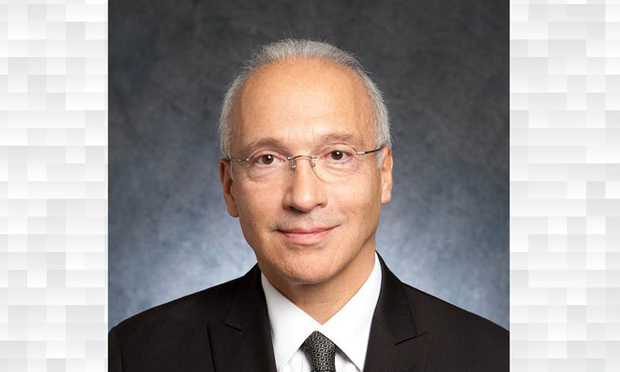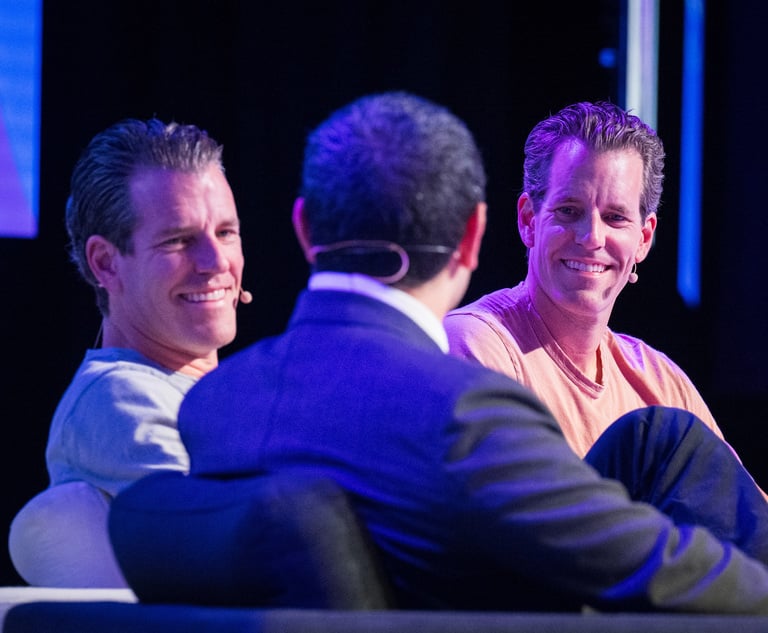Judge Leery of Weighing In on Qualcomm's Reasonableness in Apple Case
The chip giant wants U.S. District Judge Gonzalo Curiel to declare that its cellphone patent licensing offer to Apple was fair and reasonable. But the judge suggested at a hearing Friday that would be premature.
January 28, 2019 at 06:41 PM
4 minute read
 U.S. District Judge Gonzalo Curiel.
U.S. District Judge Gonzalo Curiel.
Qualcomm Inc. shouldn't expect a pretrial ruling from U.S. District Judge Gonzalo Curiel on the reasonableness of its licensing offer to Apple Inc. before Apple filed its 2017 antitrust suit.
At least, that was the impression Curiel gave at a hearing Friday as the second of three Qualcomm antitrust trials draws closer. But Curiel sounded determined to go forward with an April jury trial, despite “all of the moving parts” generated by the sprawling antitrust litigation in San Diego and by the Federal Trade Commission's antitrust action against Qualcomm in San Jose.
Lawyers for Qualcomm, Apple and Apple's contract manufacturers gathered in Curiel's courtroom Friday with trial about 10 weeks off in San Diego, and as U.S. District Judge Lucy Koh nears the conclusion of a bench trial in the FTC case in San Jose. The FTC is seeking to enjoin Qualcomm from certain practices such as refusing to license its competitors and threatening to withhold cellphone modem chips from companies that balk at Qualcomm's licensing terms, a policy dubbed “no license, no chips.”
Qualcomm, meanwhile, is asking Curiel to declare that Qualcomm made a fair, reasonable and non-discriminatory (FRAND) royalty offer to Apple before negotiations broke down at the end of 2016. Cravath, Swaine & Moore partner Richard Stark said such a ruling could establish that Apple is an unwilling licensee and pave the way for an injunction.
Apple wants Curiel to dismiss that claim, saying it's irrelevant to the antitrust and breach-of-contract issues at the center of the case. Curiel sounded sympathetic to Apple.
“I'm having problems understanding how it is that this offer made by Qualcomm in 2016 would affect the jury's determination about what was going on in 2013, 14, 15” with regard to “no-license, no chips” and the refusal to license competitors, Curiel said.
Fish & Richardson partner Ruffin Cordell argued for Apple that Qualcomm is trying to keep evidence of its negotiating tactics away from jurors while obtaining a judicial endorsement of its royalty rates. “They want to use it with other industry players,” he said.
Cordell argued that such a determination would require Curiel to make an individualized assessment of all of the declared standard-essential patents in Qualcomm's portfolio. “These things aren't weighed by the pound,” he said. But even if Curiel did make such a ruling, it would be advisory only because Apple hasn't consented to be bound, Cordell said.
Those arguments seemed to resonate. “What is the utility of the court taking the time to make that determination at the end of the day?” Curiel asked Stark.
Stark said “a huge amount of proof” about the negotiations has been made available to Curiel as part of the litigation. The jury trial will at least implicitly determine whether Qualcomm satisfied its FRAND obligations. “We're asking that that determination be made explicit,” he said.
Curiel sounded wary. He noted that Koh has already ruled that Qualcomm had a duty to license chipmaking rivals as part of its FRAND commitment. “It seems to me between this litigation and what has unfolded in front of Judge Koh that it could be impossible to make it as simple as yes, Qualcomm, what you offered is FRAND compliant,” Curiel said.
There's no guarantee that Koh will issue findings of facts and conclusions of law before the San Diego trial gets underway. But Curiel didn't sound interested in waiting. He told the parties he will expect them to submit their own proposed findings of fact and conclusions of law shortly after trial. “What I don't want is to drag this on and the next thing you know we're in the summer or fall,” he said.
This content has been archived. It is available through our partners, LexisNexis® and Bloomberg Law.
To view this content, please continue to their sites.
Not a Lexis Subscriber?
Subscribe Now
Not a Bloomberg Law Subscriber?
Subscribe Now
NOT FOR REPRINT
© 2025 ALM Global, LLC, All Rights Reserved. Request academic re-use from www.copyright.com. All other uses, submit a request to [email protected]. For more information visit Asset & Logo Licensing.
You Might Like
View All
TikTok Hit With California Class Action for Allegedly Mining Children's Data Without Parental Consent

Apple Disputes 'Efforts to Manufacture' Imaging Sensor Claims Against iPhone 15 Technology

‘Not a Regulatory Gray Area’: CFTC Secures $5M Settlement From Gemini
3 minute readTrending Stories
- 1Many LA County Law Firms Remain Open, Mobilize to Support Affected Employees Amid Historic Firestorm
- 2Stevens & Lee Names New Delaware Shareholder
- 3U.S. Supreme Court Denies Trump Effort to Halt Sentencing
- 4From CLO to President: Kevin Boon Takes the Helm at Mysten Labs
- 5How Law Schools Fared on California's July 2024 Bar Exam
Who Got The Work
Michael G. Bongiorno, Andrew Scott Dulberg and Elizabeth E. Driscoll from Wilmer Cutler Pickering Hale and Dorr have stepped in to represent Symbotic Inc., an A.I.-enabled technology platform that focuses on increasing supply chain efficiency, and other defendants in a pending shareholder derivative lawsuit. The case, filed Oct. 2 in Massachusetts District Court by the Brown Law Firm on behalf of Stephen Austen, accuses certain officers and directors of misleading investors in regard to Symbotic's potential for margin growth by failing to disclose that the company was not equipped to timely deploy its systems or manage expenses through project delays. The case, assigned to U.S. District Judge Nathaniel M. Gorton, is 1:24-cv-12522, Austen v. Cohen et al.
Who Got The Work
Edmund Polubinski and Marie Killmond of Davis Polk & Wardwell have entered appearances for data platform software development company MongoDB and other defendants in a pending shareholder derivative lawsuit. The action, filed Oct. 7 in New York Southern District Court by the Brown Law Firm, accuses the company's directors and/or officers of falsely expressing confidence in the company’s restructuring of its sales incentive plan and downplaying the severity of decreases in its upfront commitments. The case is 1:24-cv-07594, Roy v. Ittycheria et al.
Who Got The Work
Amy O. Bruchs and Kurt F. Ellison of Michael Best & Friedrich have entered appearances for Epic Systems Corp. in a pending employment discrimination lawsuit. The suit was filed Sept. 7 in Wisconsin Western District Court by Levine Eisberner LLC and Siri & Glimstad on behalf of a project manager who claims that he was wrongfully terminated after applying for a religious exemption to the defendant's COVID-19 vaccine mandate. The case, assigned to U.S. Magistrate Judge Anita Marie Boor, is 3:24-cv-00630, Secker, Nathan v. Epic Systems Corporation.
Who Got The Work
David X. Sullivan, Thomas J. Finn and Gregory A. Hall from McCarter & English have entered appearances for Sunrun Installation Services in a pending civil rights lawsuit. The complaint was filed Sept. 4 in Connecticut District Court by attorney Robert M. Berke on behalf of former employee George Edward Steins, who was arrested and charged with employing an unregistered home improvement salesperson. The complaint alleges that had Sunrun informed the Connecticut Department of Consumer Protection that the plaintiff's employment had ended in 2017 and that he no longer held Sunrun's home improvement contractor license, he would not have been hit with charges, which were dismissed in May 2024. The case, assigned to U.S. District Judge Jeffrey A. Meyer, is 3:24-cv-01423, Steins v. Sunrun, Inc. et al.
Who Got The Work
Greenberg Traurig shareholder Joshua L. Raskin has entered an appearance for boohoo.com UK Ltd. in a pending patent infringement lawsuit. The suit, filed Sept. 3 in Texas Eastern District Court by Rozier Hardt McDonough on behalf of Alto Dynamics, asserts five patents related to an online shopping platform. The case, assigned to U.S. District Judge Rodney Gilstrap, is 2:24-cv-00719, Alto Dynamics, LLC v. boohoo.com UK Limited.
Featured Firms
Law Offices of Gary Martin Hays & Associates, P.C.
(470) 294-1674
Law Offices of Mark E. Salomone
(857) 444-6468
Smith & Hassler
(713) 739-1250







